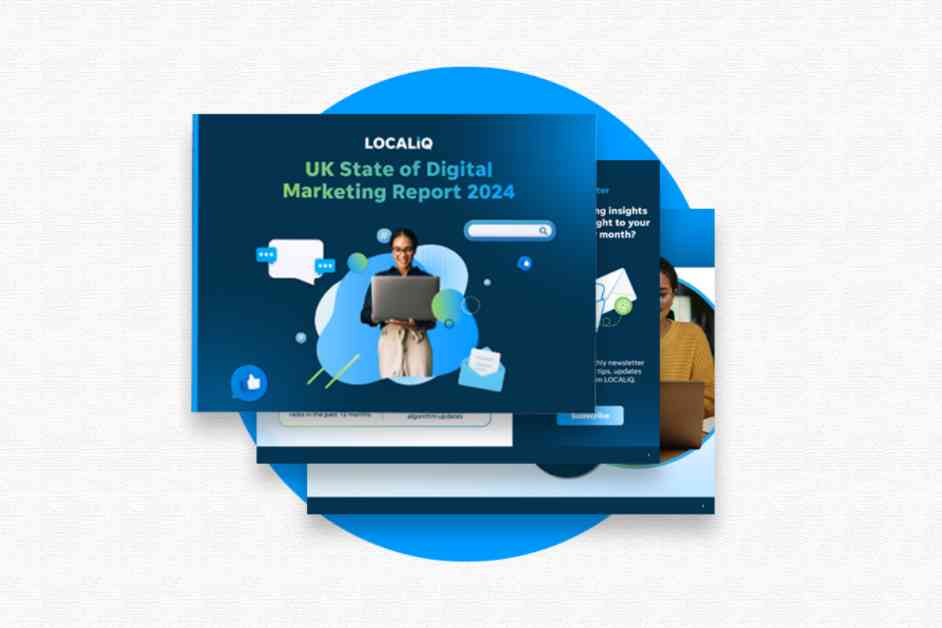Award-winning digital marketing agency LOCALiQ has recently released its second annual State of Digital Marketing Report based on a nationwide survey conducted in the summer of 2023. The survey gathered responses from over 500 businesses across various industries in the UK, shedding light on the goals, strategies, and budgets of marketers in the country.
Challenges Revealed by the Survey
One of the key findings of the report was the significant struggle that 75% of businesses face in maintaining innovative marketing tactics, strategies, and technologies. This highlights the ever-evolving nature of the digital marketing landscape and the constant need for businesses to adapt and stay ahead of the curve.
Over the past 12 months, marketers have encountered a myriad of challenges, from navigating privacy laws and algorithm updates to developing strategies for emerging marketing channels. These challenges have tested the resilience and creativity of businesses as they strive to connect with their target audiences in meaningful ways.
The most pressing obstacle identified by the survey respondents was the difficulty in accessing, organizing, and utilizing customer data effectively. Understanding and defining the target audience came in a close second, underscoring the importance of data-driven marketing strategies in today’s competitive marketplace.
Nikki Broxup, Marketing Director at LOCALiQ, emphasized the critical role of data in shaping marketing efforts. She stated, “With so many potential customer touchpoints, it’s vital for marketers to harness the data they collect from site visitors, leads, and customers. This data not only helps businesses understand their audience better but also enables them to tailor their marketing strategies to meet specific customer needs.”
SEO Challenges Faced by Businesses
Another significant challenge identified in the report was the perceived ineffectiveness of SEO strategies by 68% of businesses. Despite the widespread adoption of SEO as a crucial marketing tool, many businesses expressed dissatisfaction with the results they were seeing from their efforts.
With 98% of businesses having a website and over half considering it an active marketing channel, the importance of a strong organic search presence cannot be overstated. However, the report revealed that two-thirds of businesses utilizing SEO were not entirely satisfied with the outcomes, indicating a need for improvement in this area.
Moreover, 38% of businesses admitted to requiring more training in SEO, marking a 10% increase from the previous year. This surpasses the demand for training in other key areas such as social media, content marketing, and email marketing, highlighting the growing complexity of SEO as a digital marketing discipline.
Nikki Broxup offered valuable insights into addressing SEO challenges, stating, “SEO presents one of the steepest learning curves in marketing and demands continuous learning to remain competitive. Changes in search algorithms can render tactics obsolete quickly, while businesses with subpar websites may find their on-page SEO strategies ineffective due to issues like slow loading times and poor navigation.”
She further emphasized the importance of tracking and analyzing SEO efforts using tools like Search Console and Google Analytics to gain deeper insights into keyword rankings and page performance. A well-executed SEO strategy is essential for businesses looking to establish a strong online presence and compete effectively in the digital landscape.
The Growing Importance of Artificial Intelligence in Marketing
The survey also revealed that 31% of businesses felt the need for more training in Artificial Intelligence (AI), reflecting the increasing interest in AI technologies among marketers. AI has gained significant momentum over the past year and has emerged as a prominent topic of discussion within the marketing community.
Major tech companies like Adobe, Google, and Microsoft have introduced AI features that are accessible to businesses of all sizes, enabling them to leverage AI capabilities in their marketing efforts. This democratization of AI tools has opened up new possibilities for businesses to enhance their marketing strategies and drive better results.
Nikki Broxup highlighted the significance of AI in marketing, stating, “While AI is not a new concept, its widespread adoption in marketing is unprecedented. The emergence of AI-powered tools like ChatGPT has sparked conversations about the quality and ethics of AI-generated content, signaling the potential for AI to revolutionize various aspects of marketing.”
She emphasized that AI has diverse applications beyond content creation, with Google and Bing utilizing AI to improve user experience and optimize paid search campaigns. However, many businesses remain uncertain about how to integrate AI into their marketing strategies effectively, citing concerns about the reliability and originality of AI-generated content.
As a marketing agency, LOCALiQ prioritizes staying abreast of industry developments and equipping its experts with the knowledge needed to leverage AI effectively. By providing guidance and training to clients on adopting an AI-centric approach to marketing, the agency aims to empower businesses to capitalize on the benefits of AI technologies.
Addressing Marketing Challenges Through Innovation and Adaptation
In conclusion, the State of Digital Marketing Report by LOCALiQ offers valuable insights into the challenges facing businesses in the ever-evolving marketing landscape. From data utilization and SEO effectiveness to AI integration, marketers are confronted with a myriad of obstacles that require innovative solutions and adaptive strategies.
By embracing the transformative power of data-driven marketing, enhancing SEO practices, and harnessing the potential of AI technologies, businesses can overcome these challenges and position themselves for success in the digital age. As the marketing landscape continues to evolve, staying ahead of the curve and embracing innovation will be key to driving growth and achieving sustainable results in an increasingly competitive marketplace.



















